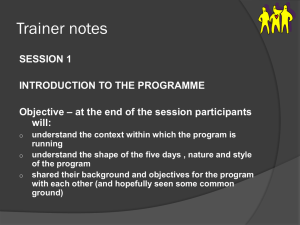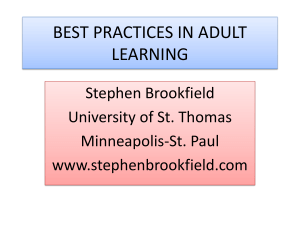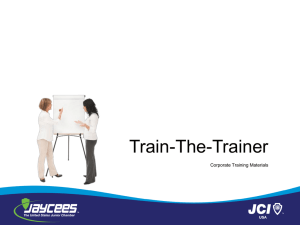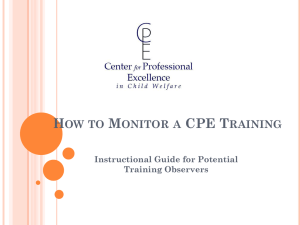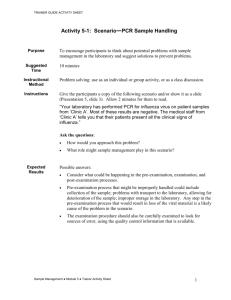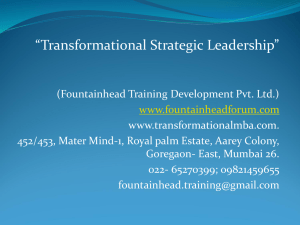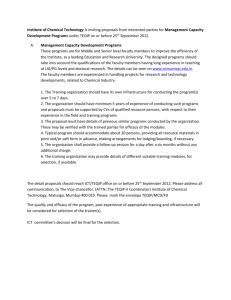Institute of Chemical Technology Training programs under TEQIP
advertisement
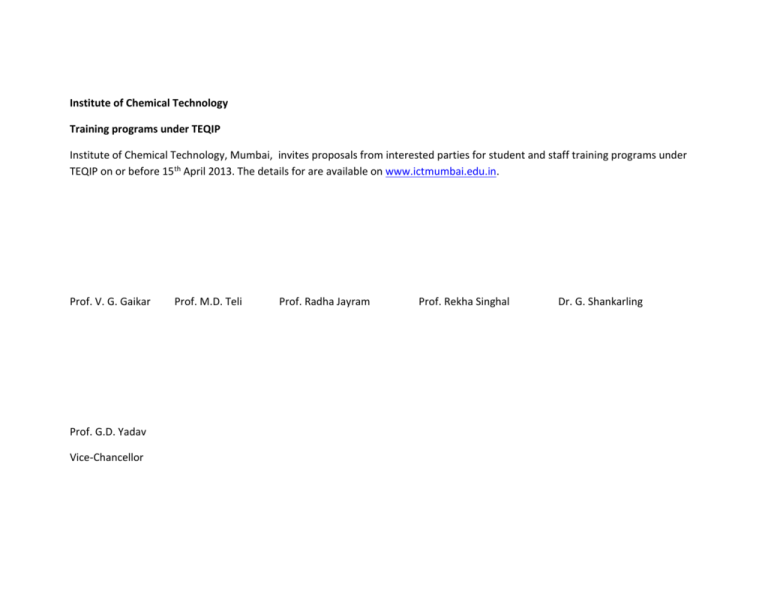
Institute of Chemical Technology Training programs under TEQIP Institute of Chemical Technology, Mumbai, invites proposals from interested parties for student and staff training programs under TEQIP on or before 15th April 2013. The details for are available on www.ictmumbai.edu.in. Prof. V. G. Gaikar Prof. G.D. Yadav Vice-Chancellor Prof. M.D. Teli Prof. Radha Jayram Prof. Rekha Singhal Dr. G. Shankarling The Institute of Chemical Technology(ICT), Mumbai, is planning to conduct the following programs for training of Staff members and students of the Institute. The training programs are required in different areas as specified in the Annexures-I, II and III Instructions to Consultants for Training of Staff and Students 1. The detail proposals should reach ICT/TEQIP office on or before 15th April 2013. 2. The proposals may be all activities or activities of specialization of the trainer 3. Please address all communication, to The Vice-chancellor, (Attn: The TEQIP-II Coordinator), Institute of Chemical Technology, Matunga, Mumbai-400 019. 4. The quality and efficacy of the proposed program and the past experience of appropriate training will be considered for selection of the trainer(s). 5. The parties may be called for giving a presentation. 6. ICT Committee’s decision will be final for the selection. 7. Most of the programs will be conducted on weekends but the programs can be rescheduled on mutual convenience in the financial year 2013-14 8. The trainer can be individual or group of individual or firms imparting the necessary training. 9. The complete CVs of all trainer(s), infrastructure if and as required, past experience and feedback reports from previous trainings must accompany the proposal, alongwith financials for each program module separately. Terms of reference A. Staff Development Programs: The Staff Development Programs are for staff members (academic, accounts, technical and class III and IV employees) to improve the efficiency of the Institute as a leading Education and Research University. The proposed programs should take into account the qualifications of the staff members and their job requirements in the Institute. 1. 2. 3. 4. 5. 6. 7. 8. 9. 10. 11. The Training organization should have its own infrastructure for conducting the program(s) for the technical training and accounts personnel. The organization should have minimum 5 years of experience of conducting such programs. The proposals must be supported by detail CVs of qualified resource persons, with respect to their experience in the field and the concerned training programs. The Trainer must quote the module as asked for in the Annexures. The proposal must have details of previous similar programs conducted by the organization. These may be verified with the trained parties for efficacy of the modules. Typical program should accommodate about 30-40 persons in a batch. For accounts, the number will be restricted to 25 in a batch. The trainer shall provide all resource materials in print and/or soft forms in advance. The organization shall provide a follow-up session for a day after six months without any additional charge. The training organization may provide details of different suitable training modules, for selection, if available. The trainer will issue a certificate to the participant on successful test after the training is over. Quality and efficacy of the training program and experience in similar area will be prime criteria of selection A. Student Development Programs: 1. These programs are for students in first year and final years of graduation to improve their learning process and placement in industries. 2. The designed programs should take into account the qualifications and level of intelligence of the students as most of the students are with intellectually higher levels. 3. The organization should have minimum 5 years of experience of conducting such programs 4. The proposals must be supported by CVs of qualified resource persons, with respect to their experience in the field and training programs. 5. The proposal must have details of previous similar programs conducted by the organization. These may be verified with the trained parties for efficacy of the modules. 6. Typical program should accommodate about 50 persons per batch. 7. The trainer shall provide all resource materials in print and/or soft forms in advance. 8. The organization shall provide a follow-up session for a day after six months without any additional charge. 9. The training organization may provide details of different suitable training modules, for selection, if available, in addition to the modules in the Annexures. 10. Quality and efficacy of the training program and experience in similar area will be prime criteria of selection Annexure-I Students Development Program: Diagnostic Test and Personal Effectiveness 1. Diagnostic Test Module Diagnostic Test S1 Maturity and emotional quotient Engineering and Scientific Aptitude 1. 2. 3. 4. Tests Number of Students Total Number of Students to be tested: 450 To be handled in total 10 batches Duration Probable contents July – August 2013 Ability to take decisions and responsibility, Tests for personality traits Manage scientific curiosity Effective language communication Effective communication, limitations, improvement Quantitative Mathematical skills Imagination and Lateral thinking Able to think on abstract concepts Visualization Problem solving Quantitative and qualitative Y/N The diagnostic tests should bring out necessary steps for improvement for each student in the first year The trainer(s) also should suggest remedial measures for the improvement to the students. The party should offer a complete package as required. The test shall be conducted at ICT’s premises and database should be made available in soft form to ICT for further steps. S2 Knowing your Skills & Traits & Improving Personal Effectiveness Workshop Mode Writing Achievements / Success Stories Identifying Skills & Traits Rewriting Achievements Time management Number of Students per batch x batches 50 x 8 2-3 days for each batch Duration August – December 2013 Write Stories of own Successes & Challenges overcome Use Worksheet to Identify Dominant Skills & Traits Re-write Success Stores incorporating Skills & Traits Goals, Pillars of Time Mangt, Urgent, Important, Work plans that Work Concept of Personal Effectiveness Setting Goals / Personal Vision Breaking out of Conditioning Managing yourself Managing your work Paradigm Shift Questions Why Goals, How to Set, SMART Goals, Tracking Sheet How we condition ourselves to self imposed limitation and how to overcome same Personal Effectiveness / How you operate / Assertiveness etc Interpersonal Effectiveness / Some aspects of Stress Management What are you comfortable doing and What you enjoy and how to move towards that goals Annexure-II 2. Finishing School for Graduating Class 1 Communication Skills Importance of Communication Number of persons x batches 50 x 7 (2 days each) 50 x 7 Period contents April 2013-May 2013 & Sept 2013February 2014 Importance of Communication, Communication Model Written Communication Grammar / Common Mistakes, Spelling / Grammar / Writing Executive reports Pronunciation / Difficult Words / Making Simple Conversation Prepared Speeches / Impromptu Speeches Oral Communication Public Speaking Focus on Content-- Do & Don’t's, Storyboarding, Slide Composition, Fonts, Colors Separate for Men & Women / Posture / Clothes Presentation Skills Basic Grooming & Biz Etiquette 2 Interviews and placement CV Writing: Developing CV for Self Group Discussion- What are people looking for in GD? Interview Skills- What are people looking for in Interview? 50 x 7 (2 days each) 50x 7 April 2013- Jun 2013 & Sept 2013-Jan 2014 Types of CV, Do & Don’t's, Writing & Editing CV, Covering Letter, Responding to Advt GD Basics, Types, Sitting, Do & Don’t's, How to Prepare, Dressing, Summarizing, actual practice and critique Actual Sessions with Feedback by Observers / Look at possibility of Videography, Mock Sessions with Feedback Actual Practice & Critique, possibility of Videography, Mock Sessions with Feedback Annexure-III: Staff Development Program SD Program Module Mode SD1 Basic Computer Training Workshop SD2 Advanced Computer training Workshop SD3 Communication Skills-I Workshop 40 x 3 SD4 Communication Skills-II Workshop 30 x 1 SD5 Financial-I Workshop 30 x 1 SD7 Financial-II Workshop 30 x 1 SD8 Office Management Workshop 30 x 2 Personality Development and Workshop change in Mind set SD10 Analytical Instruments Workshop training- Maintenance and Basic Repairs 30 x 4 SD11 Basic Electrical Training Workshop 30 x 3 SD12 Stores Management, Procurement system workshop 30 SD9 Number of persons Duration x batches 40 x 2 April-Dec 2013 3 days each 40 x 2 April –Dec 2013 3 days each 30 x 1 May-Dec 2013 3 days each May- Dec 2013 2 days each May –Dec 2013 3 days each May-Dec 2012 3 days each OS, basic commands, MS-Office, WORD or Open office MS Office advanced with visual basic, Access and/or Foxpro database management, Linux OS, Open-office, data security and networking Basic communications, English basics Public Speaking & Interpersonal Communications Budgeting & Financial Management, accounting and taxation laws Salary pay roll and Tally, database management (from Tally) May-Dec 2013 3 days each May- Dec 2013 2 days each May-Dec 2013 3 days each MS or Open office, Database management, Time management,secretarial assistance, Self esteem, work ethics, goal setting May-Dec 2013 5 days each May-Dec 2013 3 days Basic electrical wiring, Basic electronics/chips, repairs and maintenance supply chain management, Inventory management, Procurement management, Registry checks, Dead Stock management Basic Electronics, Signal conditioning, data collection and integration, basic maintenance of instruments
